Hospitality Consumer Behaviour and Insight
VerifiedAdded on 2023/06/17
|14
|4140
|148
AI Summary
This report discusses the factors that influence hospitality consumer behaviour and attitudes, the decision-making process, appropriate forms of research to understand influences on the hospitality consumer decision-making process, and how marketers influence the different stages of the hospitality consumer decision-making process. The report uses The Resident Victoria as a base company and covers personal, social, cultural, and psychological factors that influence consumer behaviour. It also discusses the impact of digital technology on consumer trends and the importance of marketers in understanding consumer behaviour. The report evaluates different approaches to market research and methods of research used for understanding the decision-making process.
Contribute Materials
Your contribution can guide someone’s learning journey. Share your
documents today.
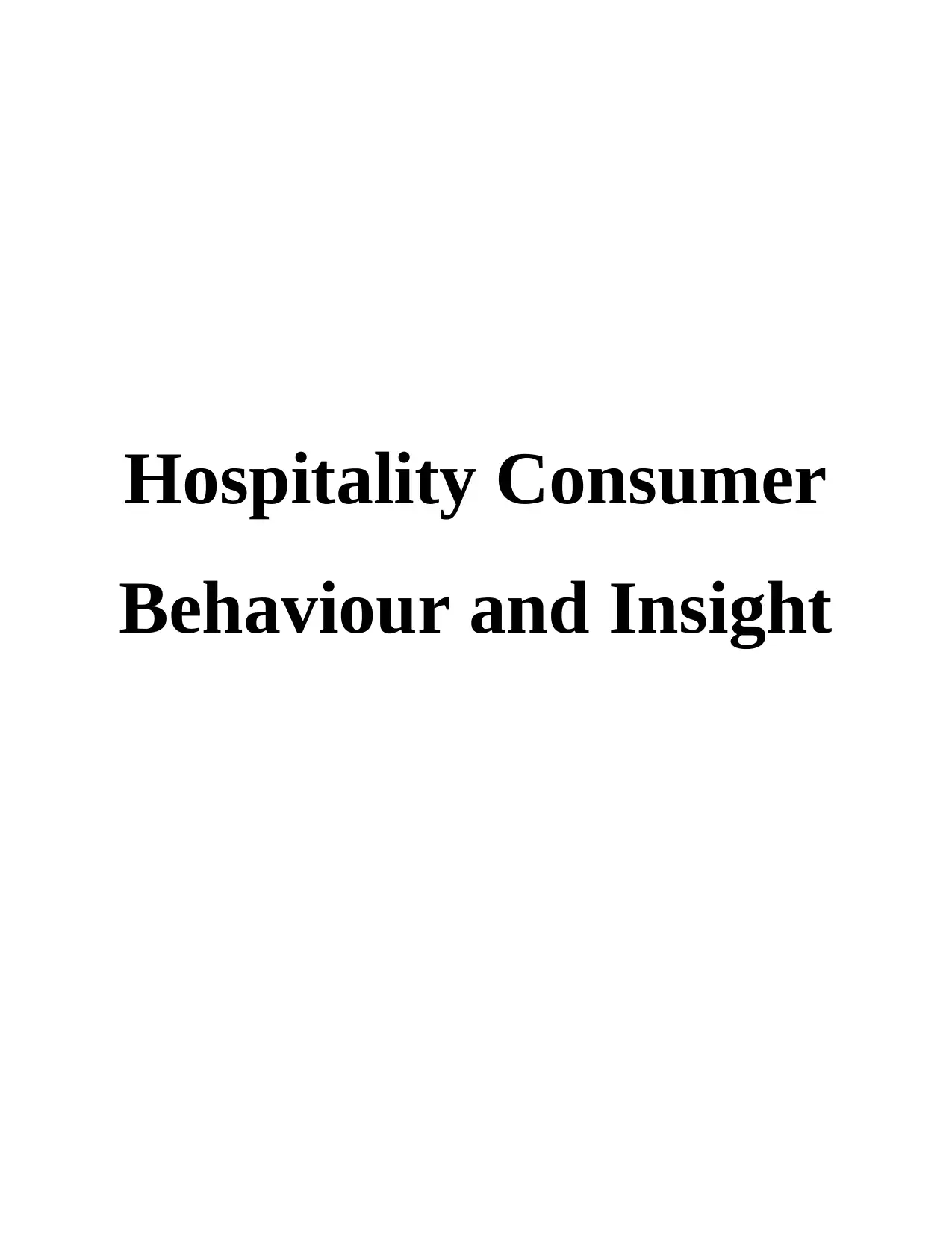
Hospitality Consumer
Behaviour and Insight
Behaviour and Insight
Secure Best Marks with AI Grader
Need help grading? Try our AI Grader for instant feedback on your assignments.
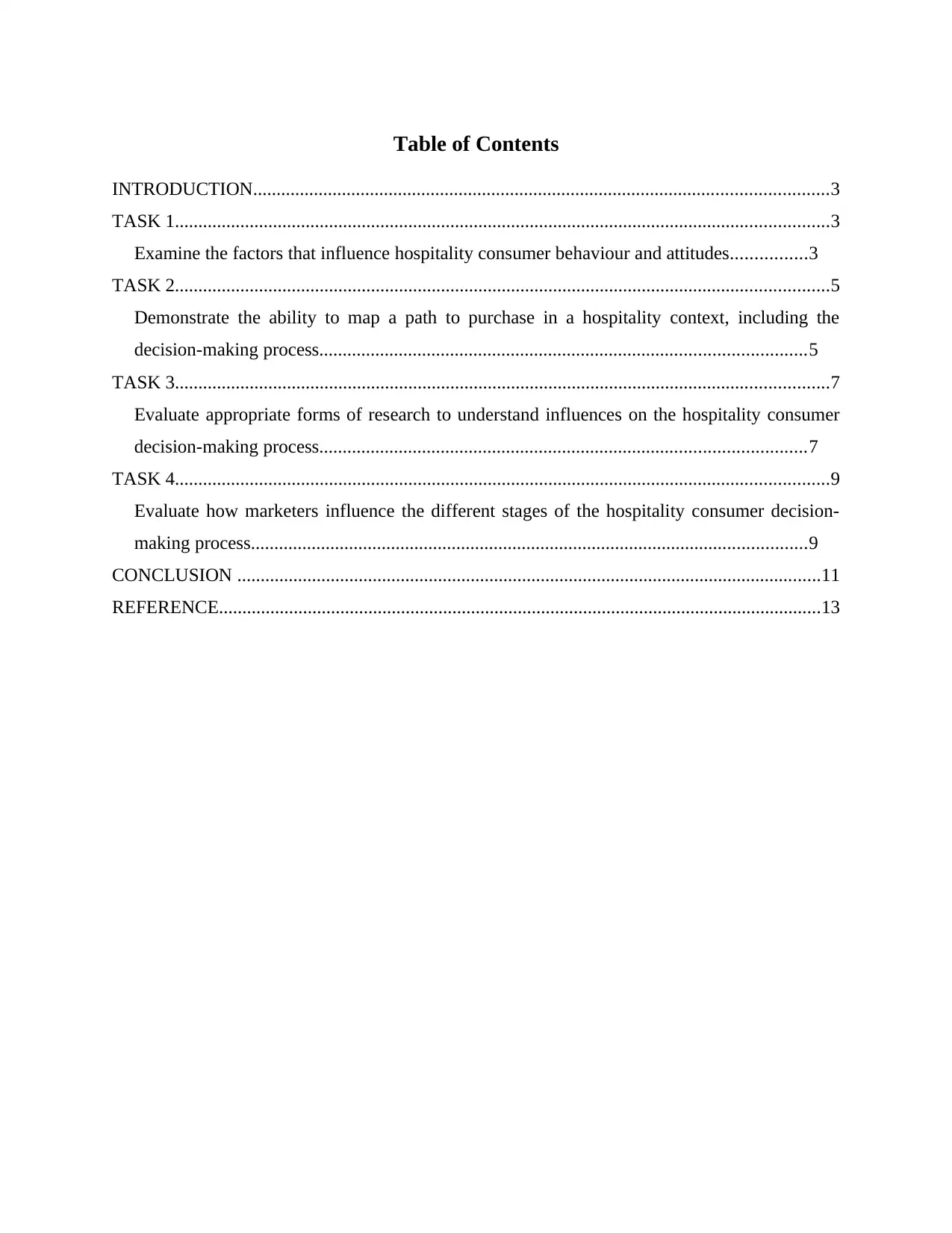
Table of Contents
INTRODUCTION...........................................................................................................................3
TASK 1............................................................................................................................................3
Examine the factors that influence hospitality consumer behaviour and attitudes................3
TASK 2............................................................................................................................................5
Demonstrate the ability to map a path to purchase in a hospitality context, including the
decision-making process........................................................................................................5
TASK 3............................................................................................................................................7
Evaluate appropriate forms of research to understand influences on the hospitality consumer
decision-making process........................................................................................................7
TASK 4............................................................................................................................................9
Evaluate how marketers influence the different stages of the hospitality consumer decision-
making process.......................................................................................................................9
CONCLUSION .............................................................................................................................11
REFERENCE.................................................................................................................................13
INTRODUCTION...........................................................................................................................3
TASK 1............................................................................................................................................3
Examine the factors that influence hospitality consumer behaviour and attitudes................3
TASK 2............................................................................................................................................5
Demonstrate the ability to map a path to purchase in a hospitality context, including the
decision-making process........................................................................................................5
TASK 3............................................................................................................................................7
Evaluate appropriate forms of research to understand influences on the hospitality consumer
decision-making process........................................................................................................7
TASK 4............................................................................................................................................9
Evaluate how marketers influence the different stages of the hospitality consumer decision-
making process.......................................................................................................................9
CONCLUSION .............................................................................................................................11
REFERENCE.................................................................................................................................13

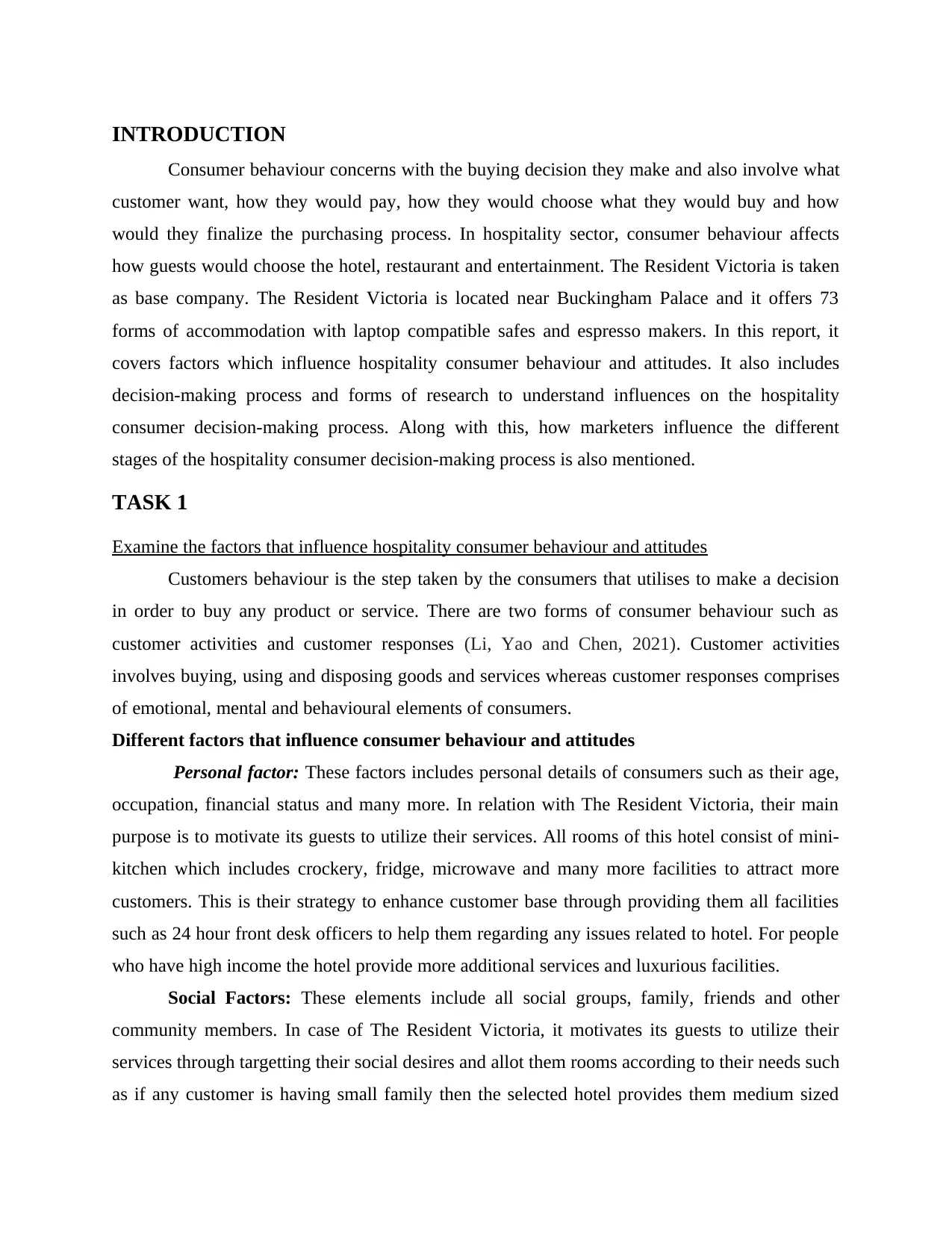
INTRODUCTION
Consumer behaviour concerns with the buying decision they make and also involve what
customer want, how they would pay, how they would choose what they would buy and how
would they finalize the purchasing process. In hospitality sector, consumer behaviour affects
how guests would choose the hotel, restaurant and entertainment. The Resident Victoria is taken
as base company. The Resident Victoria is located near Buckingham Palace and it offers 73
forms of accommodation with laptop compatible safes and espresso makers. In this report, it
covers factors which influence hospitality consumer behaviour and attitudes. It also includes
decision-making process and forms of research to understand influences on the hospitality
consumer decision-making process. Along with this, how marketers influence the different
stages of the hospitality consumer decision-making process is also mentioned.
TASK 1
Examine the factors that influence hospitality consumer behaviour and attitudes
Customers behaviour is the step taken by the consumers that utilises to make a decision
in order to buy any product or service. There are two forms of consumer behaviour such as
customer activities and customer responses (Li, Yao and Chen, 2021). Customer activities
involves buying, using and disposing goods and services whereas customer responses comprises
of emotional, mental and behavioural elements of consumers.
Different factors that influence consumer behaviour and attitudes
Personal factor: These factors includes personal details of consumers such as their age,
occupation, financial status and many more. In relation with The Resident Victoria, their main
purpose is to motivate its guests to utilize their services. All rooms of this hotel consist of mini-
kitchen which includes crockery, fridge, microwave and many more facilities to attract more
customers. This is their strategy to enhance customer base through providing them all facilities
such as 24 hour front desk officers to help them regarding any issues related to hotel. For people
who have high income the hotel provide more additional services and luxurious facilities.
Social Factors: These elements include all social groups, family, friends and other
community members. In case of The Resident Victoria, it motivates its guests to utilize their
services through targetting their social desires and allot them rooms according to their needs such
as if any customer is having small family then the selected hotel provides them medium sized
Consumer behaviour concerns with the buying decision they make and also involve what
customer want, how they would pay, how they would choose what they would buy and how
would they finalize the purchasing process. In hospitality sector, consumer behaviour affects
how guests would choose the hotel, restaurant and entertainment. The Resident Victoria is taken
as base company. The Resident Victoria is located near Buckingham Palace and it offers 73
forms of accommodation with laptop compatible safes and espresso makers. In this report, it
covers factors which influence hospitality consumer behaviour and attitudes. It also includes
decision-making process and forms of research to understand influences on the hospitality
consumer decision-making process. Along with this, how marketers influence the different
stages of the hospitality consumer decision-making process is also mentioned.
TASK 1
Examine the factors that influence hospitality consumer behaviour and attitudes
Customers behaviour is the step taken by the consumers that utilises to make a decision
in order to buy any product or service. There are two forms of consumer behaviour such as
customer activities and customer responses (Li, Yao and Chen, 2021). Customer activities
involves buying, using and disposing goods and services whereas customer responses comprises
of emotional, mental and behavioural elements of consumers.
Different factors that influence consumer behaviour and attitudes
Personal factor: These factors includes personal details of consumers such as their age,
occupation, financial status and many more. In relation with The Resident Victoria, their main
purpose is to motivate its guests to utilize their services. All rooms of this hotel consist of mini-
kitchen which includes crockery, fridge, microwave and many more facilities to attract more
customers. This is their strategy to enhance customer base through providing them all facilities
such as 24 hour front desk officers to help them regarding any issues related to hotel. For people
who have high income the hotel provide more additional services and luxurious facilities.
Social Factors: These elements include all social groups, family, friends and other
community members. In case of The Resident Victoria, it motivates its guests to utilize their
services through targetting their social desires and allot them rooms according to their needs such
as if any customer is having small family then the selected hotel provides them medium sized
Secure Best Marks with AI Grader
Need help grading? Try our AI Grader for instant feedback on your assignments.
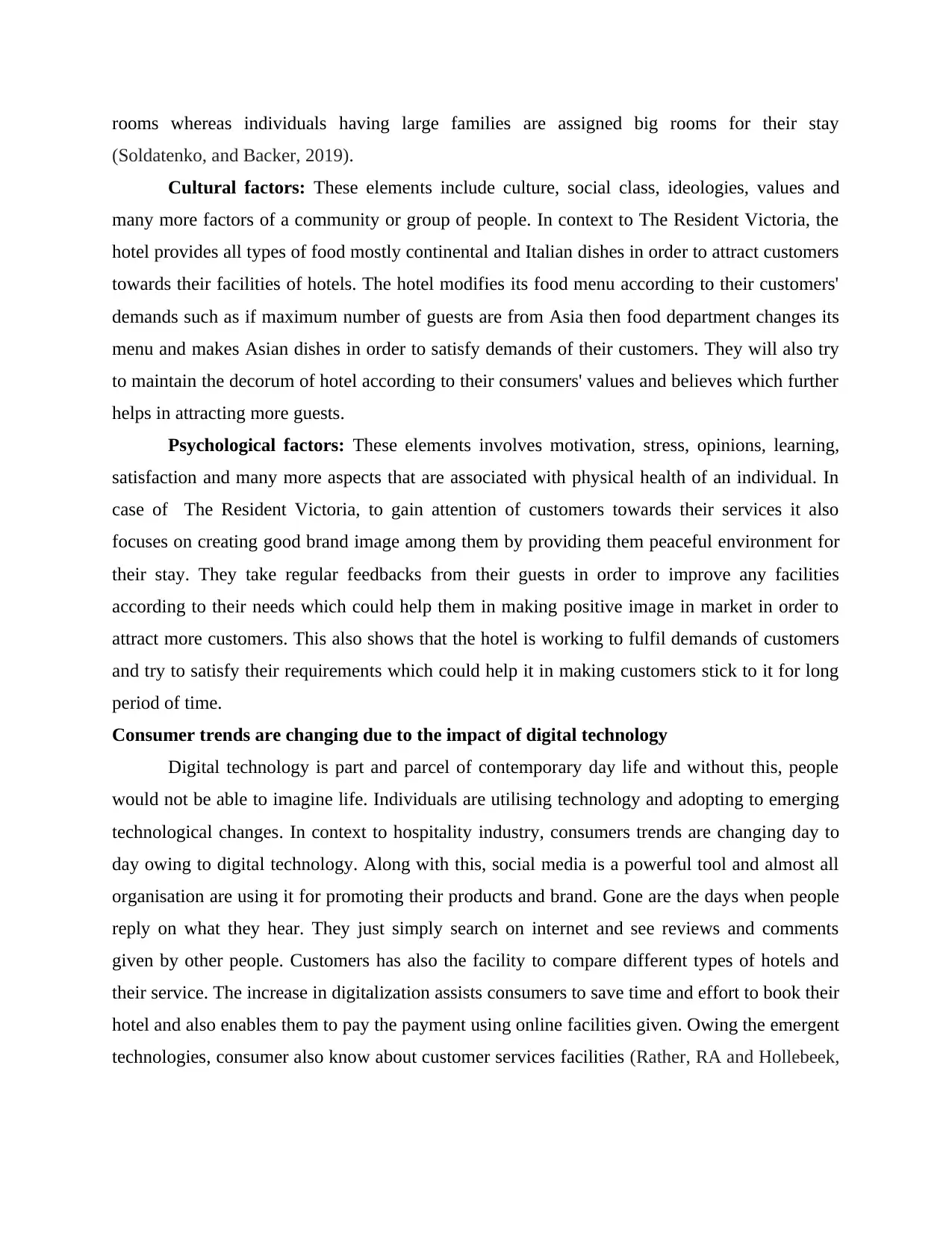
rooms whereas individuals having large families are assigned big rooms for their stay
(Soldatenko, and Backer, 2019).
Cultural factors: These elements include culture, social class, ideologies, values and
many more factors of a community or group of people. In context to The Resident Victoria, the
hotel provides all types of food mostly continental and Italian dishes in order to attract customers
towards their facilities of hotels. The hotel modifies its food menu according to their customers'
demands such as if maximum number of guests are from Asia then food department changes its
menu and makes Asian dishes in order to satisfy demands of their customers. They will also try
to maintain the decorum of hotel according to their consumers' values and believes which further
helps in attracting more guests.
Psychological factors: These elements involves motivation, stress, opinions, learning,
satisfaction and many more aspects that are associated with physical health of an individual. In
case of The Resident Victoria, to gain attention of customers towards their services it also
focuses on creating good brand image among them by providing them peaceful environment for
their stay. They take regular feedbacks from their guests in order to improve any facilities
according to their needs which could help them in making positive image in market in order to
attract more customers. This also shows that the hotel is working to fulfil demands of customers
and try to satisfy their requirements which could help it in making customers stick to it for long
period of time.
Consumer trends are changing due to the impact of digital technology
Digital technology is part and parcel of contemporary day life and without this, people
would not be able to imagine life. Individuals are utilising technology and adopting to emerging
technological changes. In context to hospitality industry, consumers trends are changing day to
day owing to digital technology. Along with this, social media is a powerful tool and almost all
organisation are using it for promoting their products and brand. Gone are the days when people
reply on what they hear. They just simply search on internet and see reviews and comments
given by other people. Customers has also the facility to compare different types of hotels and
their service. The increase in digitalization assists consumers to save time and effort to book their
hotel and also enables them to pay the payment using online facilities given. Owing the emergent
technologies, consumer also know about customer services facilities (Rather, RA and Hollebeek,
(Soldatenko, and Backer, 2019).
Cultural factors: These elements include culture, social class, ideologies, values and
many more factors of a community or group of people. In context to The Resident Victoria, the
hotel provides all types of food mostly continental and Italian dishes in order to attract customers
towards their facilities of hotels. The hotel modifies its food menu according to their customers'
demands such as if maximum number of guests are from Asia then food department changes its
menu and makes Asian dishes in order to satisfy demands of their customers. They will also try
to maintain the decorum of hotel according to their consumers' values and believes which further
helps in attracting more guests.
Psychological factors: These elements involves motivation, stress, opinions, learning,
satisfaction and many more aspects that are associated with physical health of an individual. In
case of The Resident Victoria, to gain attention of customers towards their services it also
focuses on creating good brand image among them by providing them peaceful environment for
their stay. They take regular feedbacks from their guests in order to improve any facilities
according to their needs which could help them in making positive image in market in order to
attract more customers. This also shows that the hotel is working to fulfil demands of customers
and try to satisfy their requirements which could help it in making customers stick to it for long
period of time.
Consumer trends are changing due to the impact of digital technology
Digital technology is part and parcel of contemporary day life and without this, people
would not be able to imagine life. Individuals are utilising technology and adopting to emerging
technological changes. In context to hospitality industry, consumers trends are changing day to
day owing to digital technology. Along with this, social media is a powerful tool and almost all
organisation are using it for promoting their products and brand. Gone are the days when people
reply on what they hear. They just simply search on internet and see reviews and comments
given by other people. Customers has also the facility to compare different types of hotels and
their service. The increase in digitalization assists consumers to save time and effort to book their
hotel and also enables them to pay the payment using online facilities given. Owing the emergent
technologies, consumer also know about customer services facilities (Rather, RA and Hollebeek,
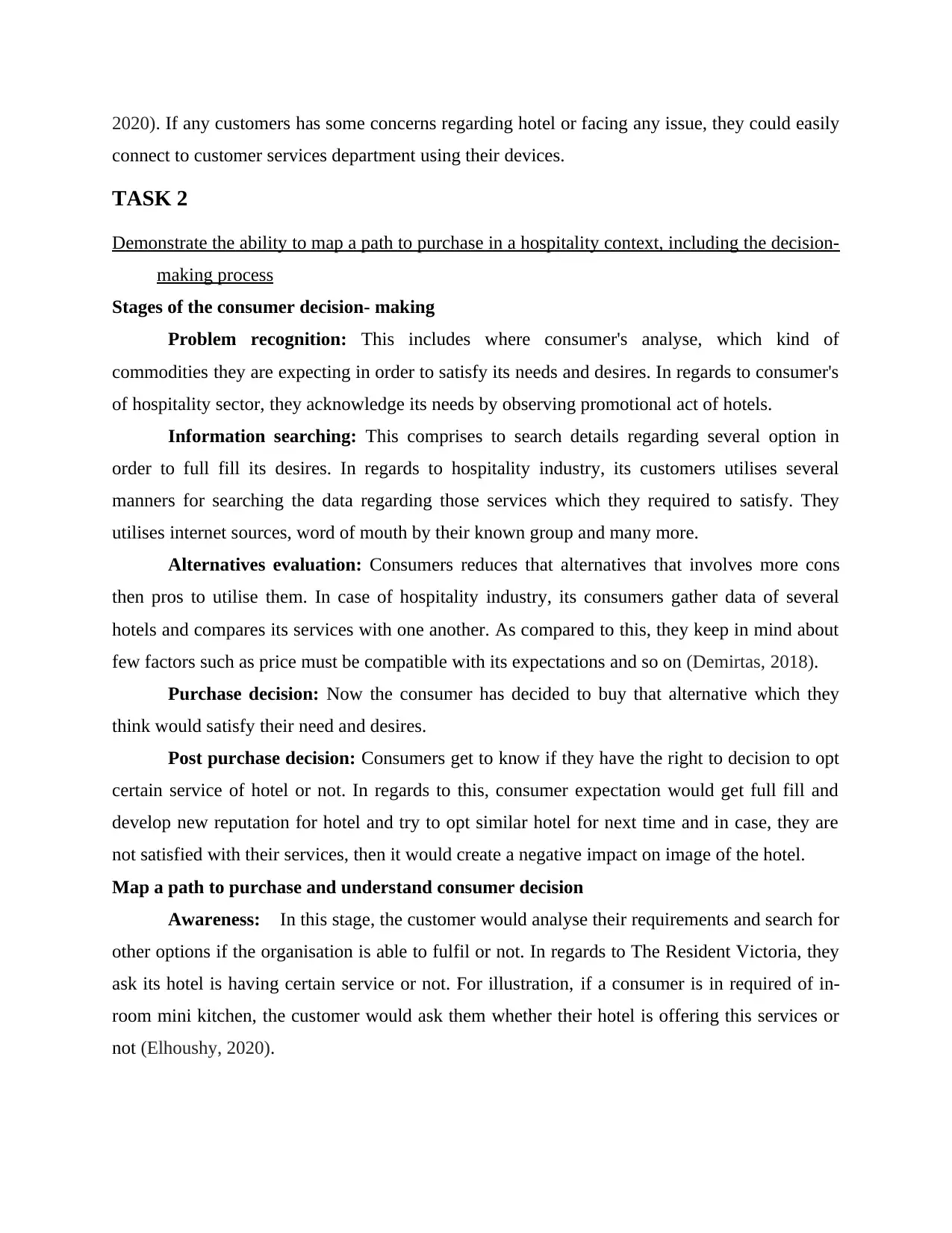
2020). If any customers has some concerns regarding hotel or facing any issue, they could easily
connect to customer services department using their devices.
TASK 2
Demonstrate the ability to map a path to purchase in a hospitality context, including the decision-
making process
Stages of the consumer decision- making
Problem recognition: This includes where consumer's analyse, which kind of
commodities they are expecting in order to satisfy its needs and desires. In regards to consumer's
of hospitality sector, they acknowledge its needs by observing promotional act of hotels.
Information searching: This comprises to search details regarding several option in
order to full fill its desires. In regards to hospitality industry, its customers utilises several
manners for searching the data regarding those services which they required to satisfy. They
utilises internet sources, word of mouth by their known group and many more.
Alternatives evaluation: Consumers reduces that alternatives that involves more cons
then pros to utilise them. In case of hospitality industry, its consumers gather data of several
hotels and compares its services with one another. As compared to this, they keep in mind about
few factors such as price must be compatible with its expectations and so on (Demirtas, 2018).
Purchase decision: Now the consumer has decided to buy that alternative which they
think would satisfy their need and desires.
Post purchase decision: Consumers get to know if they have the right to decision to opt
certain service of hotel or not. In regards to this, consumer expectation would get full fill and
develop new reputation for hotel and try to opt similar hotel for next time and in case, they are
not satisfied with their services, then it would create a negative impact on image of the hotel.
Map a path to purchase and understand consumer decision
Awareness: In this stage, the customer would analyse their requirements and search for
other options if the organisation is able to fulfil or not. In regards to The Resident Victoria, they
ask its hotel is having certain service or not. For illustration, if a consumer is in required of in-
room mini kitchen, the customer would ask them whether their hotel is offering this services or
not (Elhoushy, 2020).
connect to customer services department using their devices.
TASK 2
Demonstrate the ability to map a path to purchase in a hospitality context, including the decision-
making process
Stages of the consumer decision- making
Problem recognition: This includes where consumer's analyse, which kind of
commodities they are expecting in order to satisfy its needs and desires. In regards to consumer's
of hospitality sector, they acknowledge its needs by observing promotional act of hotels.
Information searching: This comprises to search details regarding several option in
order to full fill its desires. In regards to hospitality industry, its customers utilises several
manners for searching the data regarding those services which they required to satisfy. They
utilises internet sources, word of mouth by their known group and many more.
Alternatives evaluation: Consumers reduces that alternatives that involves more cons
then pros to utilise them. In case of hospitality industry, its consumers gather data of several
hotels and compares its services with one another. As compared to this, they keep in mind about
few factors such as price must be compatible with its expectations and so on (Demirtas, 2018).
Purchase decision: Now the consumer has decided to buy that alternative which they
think would satisfy their need and desires.
Post purchase decision: Consumers get to know if they have the right to decision to opt
certain service of hotel or not. In regards to this, consumer expectation would get full fill and
develop new reputation for hotel and try to opt similar hotel for next time and in case, they are
not satisfied with their services, then it would create a negative impact on image of the hotel.
Map a path to purchase and understand consumer decision
Awareness: In this stage, the customer would analyse their requirements and search for
other options if the organisation is able to fulfil or not. In regards to The Resident Victoria, they
ask its hotel is having certain service or not. For illustration, if a consumer is in required of in-
room mini kitchen, the customer would ask them whether their hotel is offering this services or
not (Elhoushy, 2020).
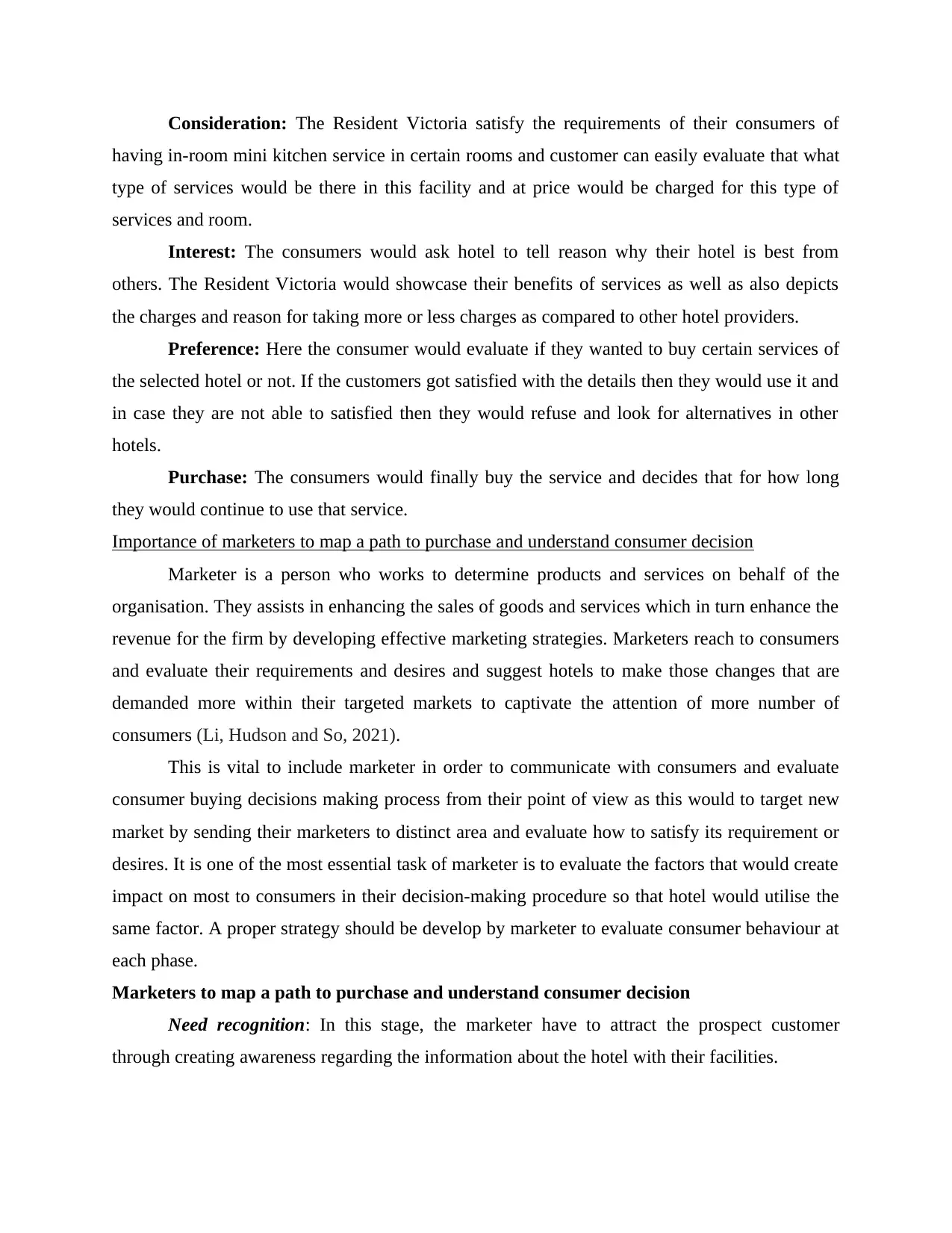
Consideration: The Resident Victoria satisfy the requirements of their consumers of
having in-room mini kitchen service in certain rooms and customer can easily evaluate that what
type of services would be there in this facility and at price would be charged for this type of
services and room.
Interest: The consumers would ask hotel to tell reason why their hotel is best from
others. The Resident Victoria would showcase their benefits of services as well as also depicts
the charges and reason for taking more or less charges as compared to other hotel providers.
Preference: Here the consumer would evaluate if they wanted to buy certain services of
the selected hotel or not. If the customers got satisfied with the details then they would use it and
in case they are not able to satisfied then they would refuse and look for alternatives in other
hotels.
Purchase: The consumers would finally buy the service and decides that for how long
they would continue to use that service.
Importance of marketers to map a path to purchase and understand consumer decision
Marketer is a person who works to determine products and services on behalf of the
organisation. They assists in enhancing the sales of goods and services which in turn enhance the
revenue for the firm by developing effective marketing strategies. Marketers reach to consumers
and evaluate their requirements and desires and suggest hotels to make those changes that are
demanded more within their targeted markets to captivate the attention of more number of
consumers (Li, Hudson and So, 2021).
This is vital to include marketer in order to communicate with consumers and evaluate
consumer buying decisions making process from their point of view as this would to target new
market by sending their marketers to distinct area and evaluate how to satisfy its requirement or
desires. It is one of the most essential task of marketer is to evaluate the factors that would create
impact on most to consumers in their decision-making procedure so that hotel would utilise the
same factor. A proper strategy should be develop by marketer to evaluate consumer behaviour at
each phase.
Marketers to map a path to purchase and understand consumer decision
Need recognition: In this stage, the marketer have to attract the prospect customer
through creating awareness regarding the information about the hotel with their facilities.
having in-room mini kitchen service in certain rooms and customer can easily evaluate that what
type of services would be there in this facility and at price would be charged for this type of
services and room.
Interest: The consumers would ask hotel to tell reason why their hotel is best from
others. The Resident Victoria would showcase their benefits of services as well as also depicts
the charges and reason for taking more or less charges as compared to other hotel providers.
Preference: Here the consumer would evaluate if they wanted to buy certain services of
the selected hotel or not. If the customers got satisfied with the details then they would use it and
in case they are not able to satisfied then they would refuse and look for alternatives in other
hotels.
Purchase: The consumers would finally buy the service and decides that for how long
they would continue to use that service.
Importance of marketers to map a path to purchase and understand consumer decision
Marketer is a person who works to determine products and services on behalf of the
organisation. They assists in enhancing the sales of goods and services which in turn enhance the
revenue for the firm by developing effective marketing strategies. Marketers reach to consumers
and evaluate their requirements and desires and suggest hotels to make those changes that are
demanded more within their targeted markets to captivate the attention of more number of
consumers (Li, Hudson and So, 2021).
This is vital to include marketer in order to communicate with consumers and evaluate
consumer buying decisions making process from their point of view as this would to target new
market by sending their marketers to distinct area and evaluate how to satisfy its requirement or
desires. It is one of the most essential task of marketer is to evaluate the factors that would create
impact on most to consumers in their decision-making procedure so that hotel would utilise the
same factor. A proper strategy should be develop by marketer to evaluate consumer behaviour at
each phase.
Marketers to map a path to purchase and understand consumer decision
Need recognition: In this stage, the marketer have to attract the prospect customer
through creating awareness regarding the information about the hotel with their facilities.
Paraphrase This Document
Need a fresh take? Get an instant paraphrase of this document with our AI Paraphraser
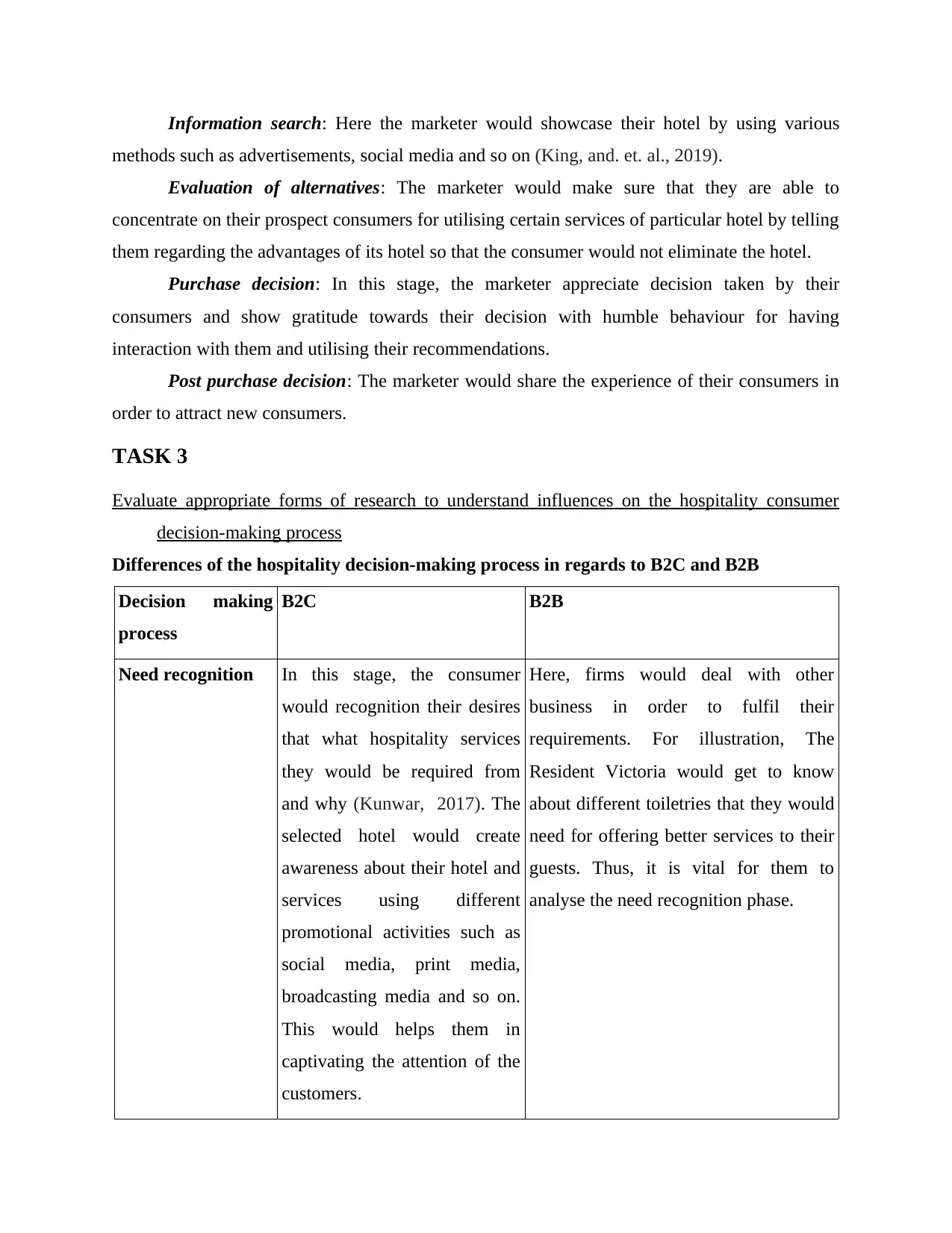
Information search: Here the marketer would showcase their hotel by using various
methods such as advertisements, social media and so on (King, and. et. al., 2019).
Evaluation of alternatives: The marketer would make sure that they are able to
concentrate on their prospect consumers for utilising certain services of particular hotel by telling
them regarding the advantages of its hotel so that the consumer would not eliminate the hotel.
Purchase decision: In this stage, the marketer appreciate decision taken by their
consumers and show gratitude towards their decision with humble behaviour for having
interaction with them and utilising their recommendations.
Post purchase decision: The marketer would share the experience of their consumers in
order to attract new consumers.
TASK 3
Evaluate appropriate forms of research to understand influences on the hospitality consumer
decision-making process
Differences of the hospitality decision-making process in regards to B2C and B2B
Decision making
process
B2C B2B
Need recognition In this stage, the consumer
would recognition their desires
that what hospitality services
they would be required from
and why (Kunwar, 2017). The
selected hotel would create
awareness about their hotel and
services using different
promotional activities such as
social media, print media,
broadcasting media and so on.
This would helps them in
captivating the attention of the
customers.
Here, firms would deal with other
business in order to fulfil their
requirements. For illustration, The
Resident Victoria would get to know
about different toiletries that they would
need for offering better services to their
guests. Thus, it is vital for them to
analyse the need recognition phase.
methods such as advertisements, social media and so on (King, and. et. al., 2019).
Evaluation of alternatives: The marketer would make sure that they are able to
concentrate on their prospect consumers for utilising certain services of particular hotel by telling
them regarding the advantages of its hotel so that the consumer would not eliminate the hotel.
Purchase decision: In this stage, the marketer appreciate decision taken by their
consumers and show gratitude towards their decision with humble behaviour for having
interaction with them and utilising their recommendations.
Post purchase decision: The marketer would share the experience of their consumers in
order to attract new consumers.
TASK 3
Evaluate appropriate forms of research to understand influences on the hospitality consumer
decision-making process
Differences of the hospitality decision-making process in regards to B2C and B2B
Decision making
process
B2C B2B
Need recognition In this stage, the consumer
would recognition their desires
that what hospitality services
they would be required from
and why (Kunwar, 2017). The
selected hotel would create
awareness about their hotel and
services using different
promotional activities such as
social media, print media,
broadcasting media and so on.
This would helps them in
captivating the attention of the
customers.
Here, firms would deal with other
business in order to fulfil their
requirements. For illustration, The
Resident Victoria would get to know
about different toiletries that they would
need for offering better services to their
guests. Thus, it is vital for them to
analyse the need recognition phase.
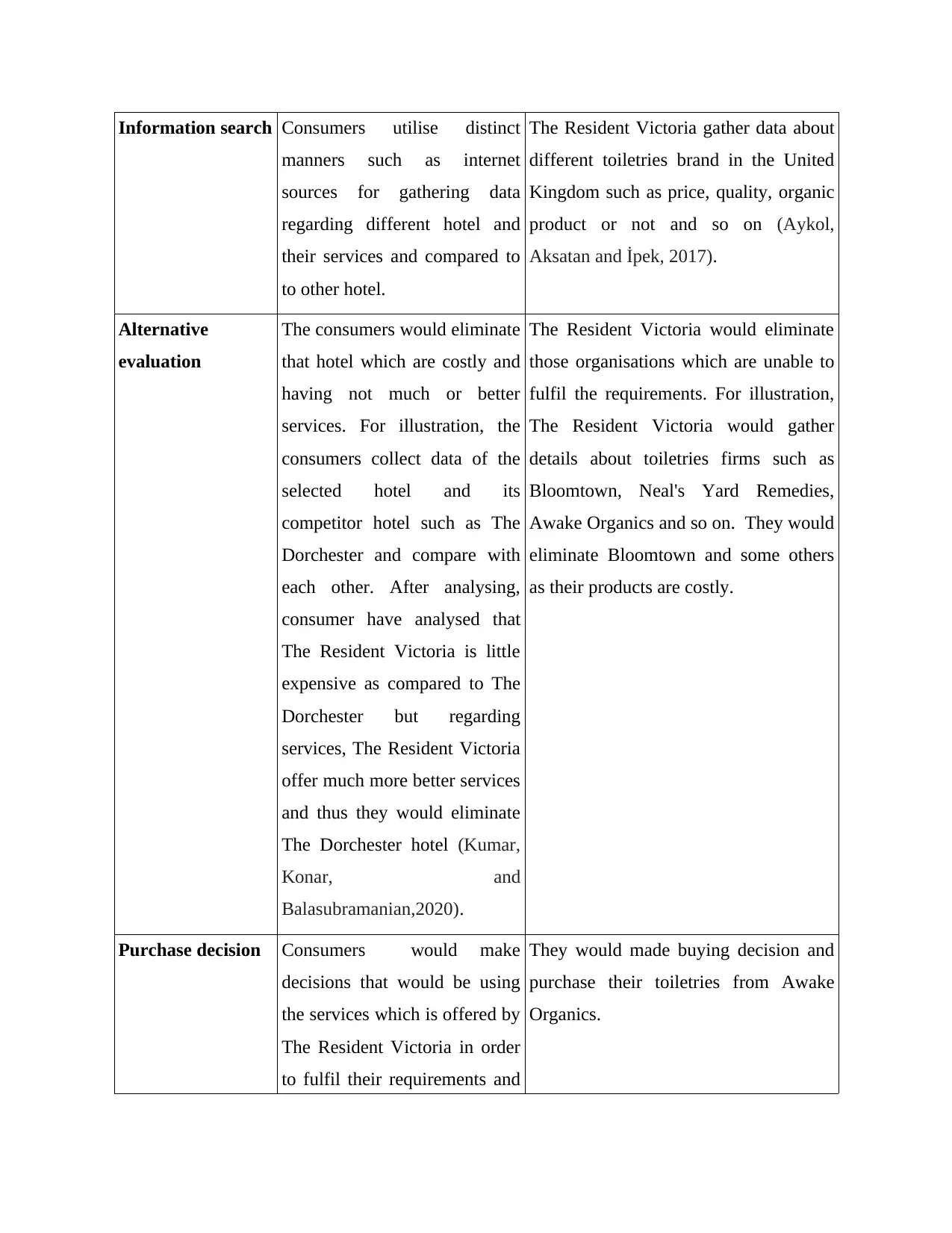
Information search Consumers utilise distinct
manners such as internet
sources for gathering data
regarding different hotel and
their services and compared to
to other hotel.
The Resident Victoria gather data about
different toiletries brand in the United
Kingdom such as price, quality, organic
product or not and so on (Aykol,
Aksatan and İpek, 2017).
Alternative
evaluation
The consumers would eliminate
that hotel which are costly and
having not much or better
services. For illustration, the
consumers collect data of the
selected hotel and its
competitor hotel such as The
Dorchester and compare with
each other. After analysing,
consumer have analysed that
The Resident Victoria is little
expensive as compared to The
Dorchester but regarding
services, The Resident Victoria
offer much more better services
and thus they would eliminate
The Dorchester hotel (Kumar,
Konar, and
Balasubramanian,2020).
The Resident Victoria would eliminate
those organisations which are unable to
fulfil the requirements. For illustration,
The Resident Victoria would gather
details about toiletries firms such as
Bloomtown, Neal's Yard Remedies,
Awake Organics and so on. They would
eliminate Bloomtown and some others
as their products are costly.
Purchase decision Consumers would make
decisions that would be using
the services which is offered by
The Resident Victoria in order
to fulfil their requirements and
They would made buying decision and
purchase their toiletries from Awake
Organics.
manners such as internet
sources for gathering data
regarding different hotel and
their services and compared to
to other hotel.
The Resident Victoria gather data about
different toiletries brand in the United
Kingdom such as price, quality, organic
product or not and so on (Aykol,
Aksatan and İpek, 2017).
Alternative
evaluation
The consumers would eliminate
that hotel which are costly and
having not much or better
services. For illustration, the
consumers collect data of the
selected hotel and its
competitor hotel such as The
Dorchester and compare with
each other. After analysing,
consumer have analysed that
The Resident Victoria is little
expensive as compared to The
Dorchester but regarding
services, The Resident Victoria
offer much more better services
and thus they would eliminate
The Dorchester hotel (Kumar,
Konar, and
Balasubramanian,2020).
The Resident Victoria would eliminate
those organisations which are unable to
fulfil the requirements. For illustration,
The Resident Victoria would gather
details about toiletries firms such as
Bloomtown, Neal's Yard Remedies,
Awake Organics and so on. They would
eliminate Bloomtown and some others
as their products are costly.
Purchase decision Consumers would make
decisions that would be using
the services which is offered by
The Resident Victoria in order
to fulfil their requirements and
They would made buying decision and
purchase their toiletries from Awake
Organics.
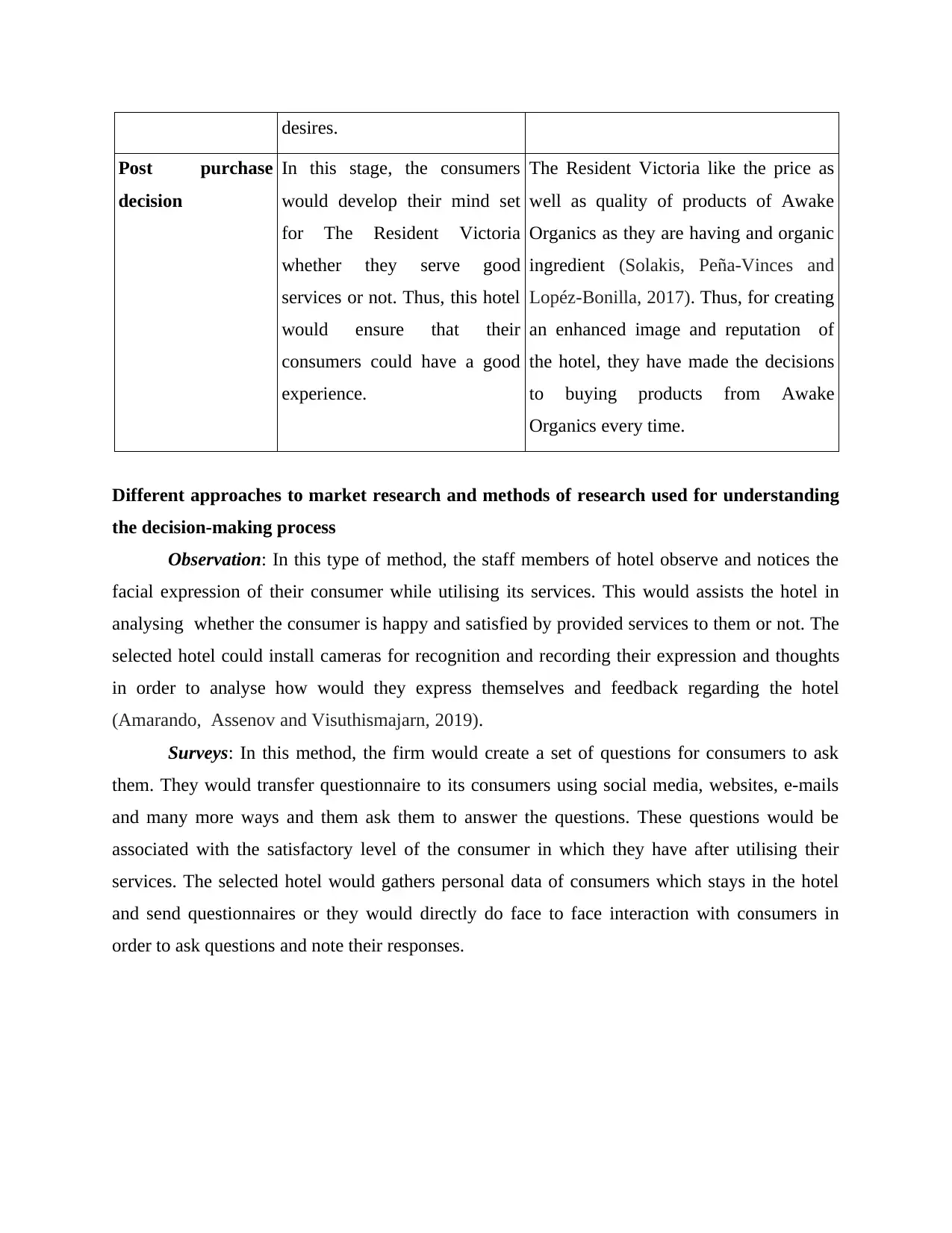
desires.
Post purchase
decision
In this stage, the consumers
would develop their mind set
for The Resident Victoria
whether they serve good
services or not. Thus, this hotel
would ensure that their
consumers could have a good
experience.
The Resident Victoria like the price as
well as quality of products of Awake
Organics as they are having and organic
ingredient (Solakis, Peña-Vinces and
Lopéz-Bonilla, 2017). Thus, for creating
an enhanced image and reputation of
the hotel, they have made the decisions
to buying products from Awake
Organics every time.
Different approaches to market research and methods of research used for understanding
the decision-making process
Observation: In this type of method, the staff members of hotel observe and notices the
facial expression of their consumer while utilising its services. This would assists the hotel in
analysing whether the consumer is happy and satisfied by provided services to them or not. The
selected hotel could install cameras for recognition and recording their expression and thoughts
in order to analyse how would they express themselves and feedback regarding the hotel
(Amarando, Assenov and Visuthismajarn, 2019).
Surveys: In this method, the firm would create a set of questions for consumers to ask
them. They would transfer questionnaire to its consumers using social media, websites, e-mails
and many more ways and them ask them to answer the questions. These questions would be
associated with the satisfactory level of the consumer in which they have after utilising their
services. The selected hotel would gathers personal data of consumers which stays in the hotel
and send questionnaires or they would directly do face to face interaction with consumers in
order to ask questions and note their responses.
Post purchase
decision
In this stage, the consumers
would develop their mind set
for The Resident Victoria
whether they serve good
services or not. Thus, this hotel
would ensure that their
consumers could have a good
experience.
The Resident Victoria like the price as
well as quality of products of Awake
Organics as they are having and organic
ingredient (Solakis, Peña-Vinces and
Lopéz-Bonilla, 2017). Thus, for creating
an enhanced image and reputation of
the hotel, they have made the decisions
to buying products from Awake
Organics every time.
Different approaches to market research and methods of research used for understanding
the decision-making process
Observation: In this type of method, the staff members of hotel observe and notices the
facial expression of their consumer while utilising its services. This would assists the hotel in
analysing whether the consumer is happy and satisfied by provided services to them or not. The
selected hotel could install cameras for recognition and recording their expression and thoughts
in order to analyse how would they express themselves and feedback regarding the hotel
(Amarando, Assenov and Visuthismajarn, 2019).
Surveys: In this method, the firm would create a set of questions for consumers to ask
them. They would transfer questionnaire to its consumers using social media, websites, e-mails
and many more ways and them ask them to answer the questions. These questions would be
associated with the satisfactory level of the consumer in which they have after utilising their
services. The selected hotel would gathers personal data of consumers which stays in the hotel
and send questionnaires or they would directly do face to face interaction with consumers in
order to ask questions and note their responses.
Secure Best Marks with AI Grader
Need help grading? Try our AI Grader for instant feedback on your assignments.
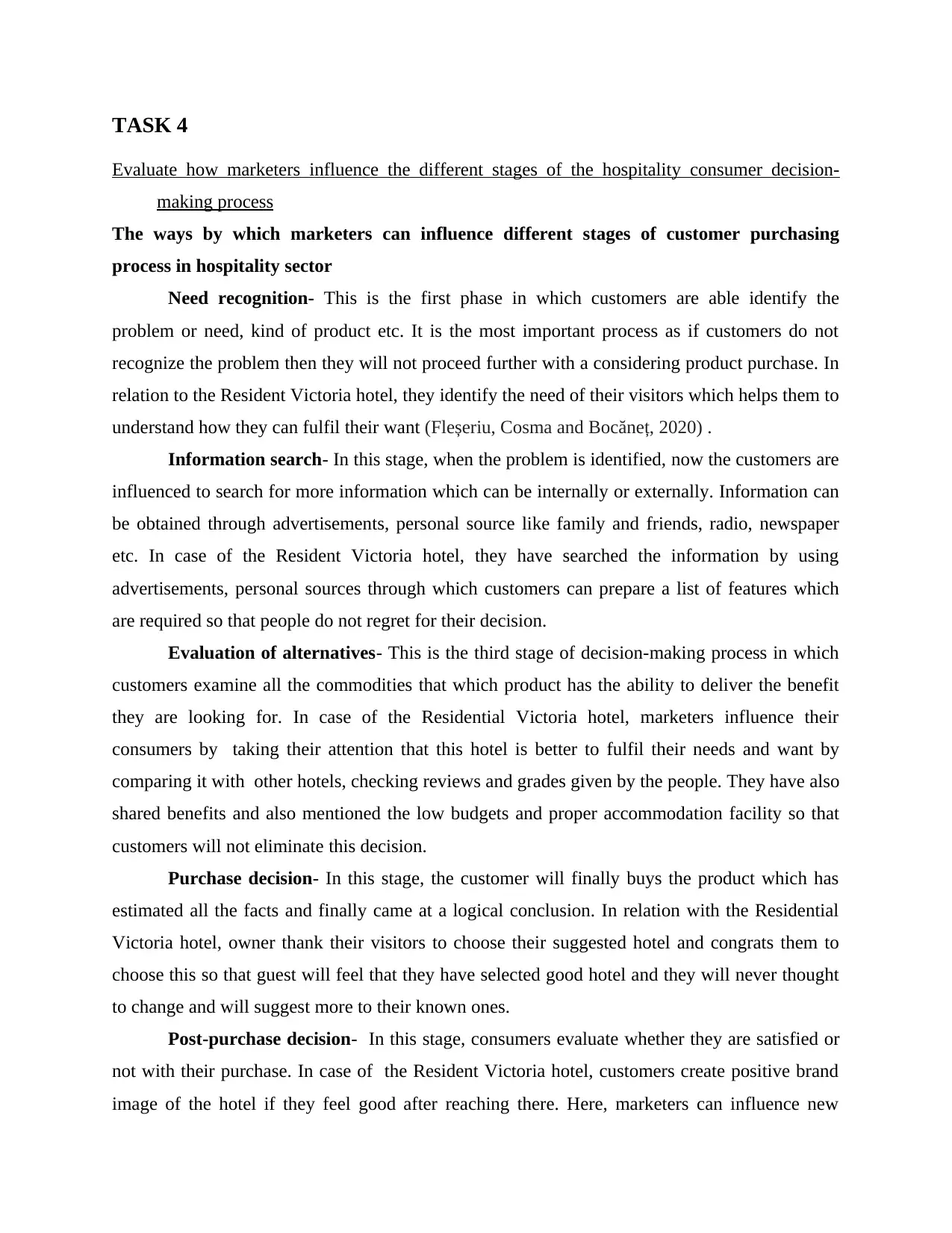
TASK 4
Evaluate how marketers influence the different stages of the hospitality consumer decision-
making process
The ways by which marketers can influence different stages of customer purchasing
process in hospitality sector
Need recognition- This is the first phase in which customers are able identify the
problem or need, kind of product etc. It is the most important process as if customers do not
recognize the problem then they will not proceed further with a considering product purchase. In
relation to the Resident Victoria hotel, they identify the need of their visitors which helps them to
understand how they can fulfil their want (Fleșeriu, Cosma and Bocăneț, 2020) .
Information search- In this stage, when the problem is identified, now the customers are
influenced to search for more information which can be internally or externally. Information can
be obtained through advertisements, personal source like family and friends, radio, newspaper
etc. In case of the Resident Victoria hotel, they have searched the information by using
advertisements, personal sources through which customers can prepare a list of features which
are required so that people do not regret for their decision.
Evaluation of alternatives- This is the third stage of decision-making process in which
customers examine all the commodities that which product has the ability to deliver the benefit
they are looking for. In case of the Residential Victoria hotel, marketers influence their
consumers by taking their attention that this hotel is better to fulfil their needs and want by
comparing it with other hotels, checking reviews and grades given by the people. They have also
shared benefits and also mentioned the low budgets and proper accommodation facility so that
customers will not eliminate this decision.
Purchase decision- In this stage, the customer will finally buys the product which has
estimated all the facts and finally came at a logical conclusion. In relation with the Residential
Victoria hotel, owner thank their visitors to choose their suggested hotel and congrats them to
choose this so that guest will feel that they have selected good hotel and they will never thought
to change and will suggest more to their known ones.
Post-purchase decision- In this stage, consumers evaluate whether they are satisfied or
not with their purchase. In case of the Resident Victoria hotel, customers create positive brand
image of the hotel if they feel good after reaching there. Here, marketers can influence new
Evaluate how marketers influence the different stages of the hospitality consumer decision-
making process
The ways by which marketers can influence different stages of customer purchasing
process in hospitality sector
Need recognition- This is the first phase in which customers are able identify the
problem or need, kind of product etc. It is the most important process as if customers do not
recognize the problem then they will not proceed further with a considering product purchase. In
relation to the Resident Victoria hotel, they identify the need of their visitors which helps them to
understand how they can fulfil their want (Fleșeriu, Cosma and Bocăneț, 2020) .
Information search- In this stage, when the problem is identified, now the customers are
influenced to search for more information which can be internally or externally. Information can
be obtained through advertisements, personal source like family and friends, radio, newspaper
etc. In case of the Resident Victoria hotel, they have searched the information by using
advertisements, personal sources through which customers can prepare a list of features which
are required so that people do not regret for their decision.
Evaluation of alternatives- This is the third stage of decision-making process in which
customers examine all the commodities that which product has the ability to deliver the benefit
they are looking for. In case of the Residential Victoria hotel, marketers influence their
consumers by taking their attention that this hotel is better to fulfil their needs and want by
comparing it with other hotels, checking reviews and grades given by the people. They have also
shared benefits and also mentioned the low budgets and proper accommodation facility so that
customers will not eliminate this decision.
Purchase decision- In this stage, the customer will finally buys the product which has
estimated all the facts and finally came at a logical conclusion. In relation with the Residential
Victoria hotel, owner thank their visitors to choose their suggested hotel and congrats them to
choose this so that guest will feel that they have selected good hotel and they will never thought
to change and will suggest more to their known ones.
Post-purchase decision- In this stage, consumers evaluate whether they are satisfied or
not with their purchase. In case of the Resident Victoria hotel, customers create positive brand
image of the hotel if they feel good after reaching there. Here, marketers can influence new
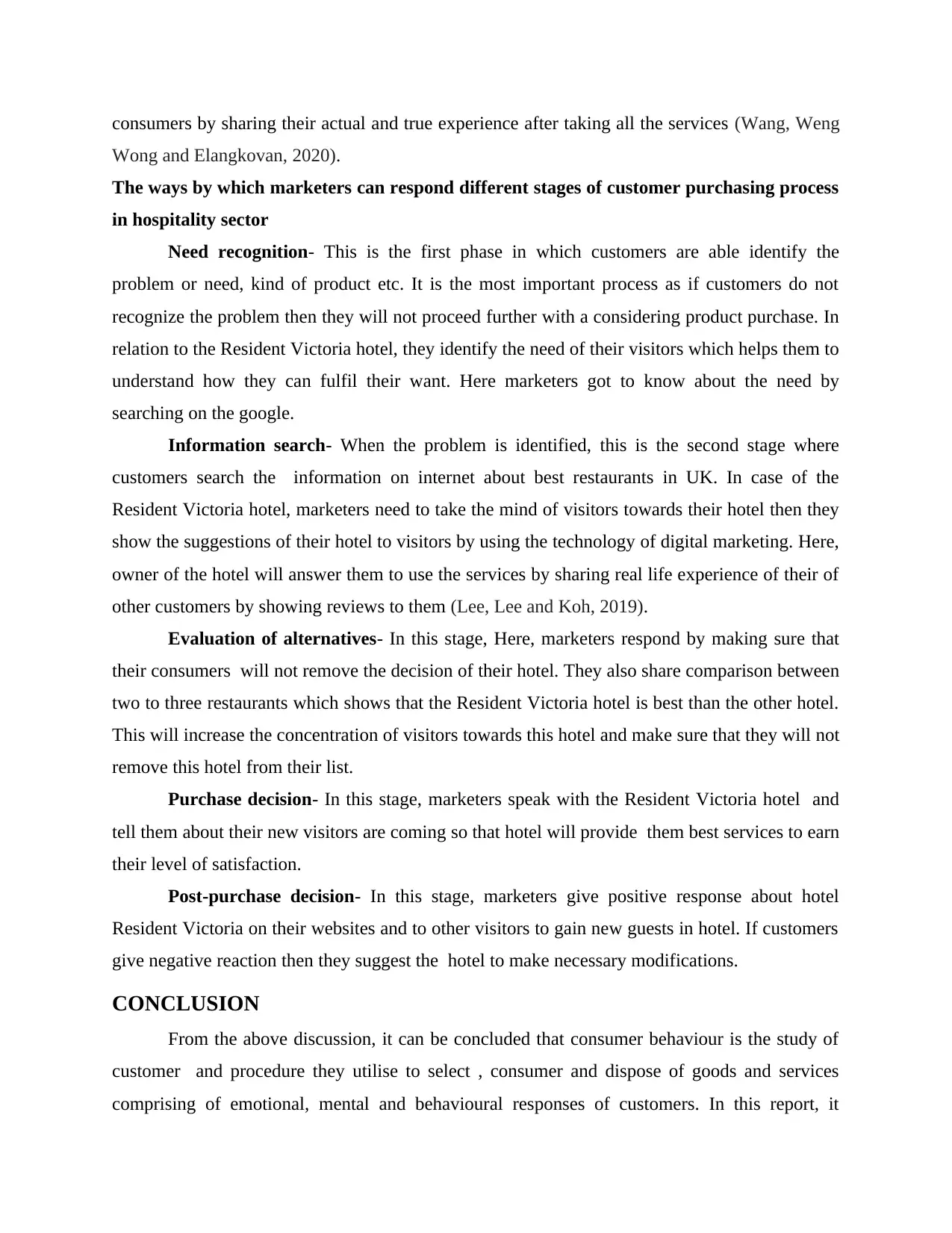
consumers by sharing their actual and true experience after taking all the services (Wang, Weng
Wong and Elangkovan, 2020).
The ways by which marketers can respond different stages of customer purchasing process
in hospitality sector
Need recognition- This is the first phase in which customers are able identify the
problem or need, kind of product etc. It is the most important process as if customers do not
recognize the problem then they will not proceed further with a considering product purchase. In
relation to the Resident Victoria hotel, they identify the need of their visitors which helps them to
understand how they can fulfil their want. Here marketers got to know about the need by
searching on the google.
Information search- When the problem is identified, this is the second stage where
customers search the information on internet about best restaurants in UK. In case of the
Resident Victoria hotel, marketers need to take the mind of visitors towards their hotel then they
show the suggestions of their hotel to visitors by using the technology of digital marketing. Here,
owner of the hotel will answer them to use the services by sharing real life experience of their of
other customers by showing reviews to them (Lee, Lee and Koh, 2019).
Evaluation of alternatives- In this stage, Here, marketers respond by making sure that
their consumers will not remove the decision of their hotel. They also share comparison between
two to three restaurants which shows that the Resident Victoria hotel is best than the other hotel.
This will increase the concentration of visitors towards this hotel and make sure that they will not
remove this hotel from their list.
Purchase decision- In this stage, marketers speak with the Resident Victoria hotel and
tell them about their new visitors are coming so that hotel will provide them best services to earn
their level of satisfaction.
Post-purchase decision- In this stage, marketers give positive response about hotel
Resident Victoria on their websites and to other visitors to gain new guests in hotel. If customers
give negative reaction then they suggest the hotel to make necessary modifications.
CONCLUSION
From the above discussion, it can be concluded that consumer behaviour is the study of
customer and procedure they utilise to select , consumer and dispose of goods and services
comprising of emotional, mental and behavioural responses of customers. In this report, it
Wong and Elangkovan, 2020).
The ways by which marketers can respond different stages of customer purchasing process
in hospitality sector
Need recognition- This is the first phase in which customers are able identify the
problem or need, kind of product etc. It is the most important process as if customers do not
recognize the problem then they will not proceed further with a considering product purchase. In
relation to the Resident Victoria hotel, they identify the need of their visitors which helps them to
understand how they can fulfil their want. Here marketers got to know about the need by
searching on the google.
Information search- When the problem is identified, this is the second stage where
customers search the information on internet about best restaurants in UK. In case of the
Resident Victoria hotel, marketers need to take the mind of visitors towards their hotel then they
show the suggestions of their hotel to visitors by using the technology of digital marketing. Here,
owner of the hotel will answer them to use the services by sharing real life experience of their of
other customers by showing reviews to them (Lee, Lee and Koh, 2019).
Evaluation of alternatives- In this stage, Here, marketers respond by making sure that
their consumers will not remove the decision of their hotel. They also share comparison between
two to three restaurants which shows that the Resident Victoria hotel is best than the other hotel.
This will increase the concentration of visitors towards this hotel and make sure that they will not
remove this hotel from their list.
Purchase decision- In this stage, marketers speak with the Resident Victoria hotel and
tell them about their new visitors are coming so that hotel will provide them best services to earn
their level of satisfaction.
Post-purchase decision- In this stage, marketers give positive response about hotel
Resident Victoria on their websites and to other visitors to gain new guests in hotel. If customers
give negative reaction then they suggest the hotel to make necessary modifications.
CONCLUSION
From the above discussion, it can be concluded that consumer behaviour is the study of
customer and procedure they utilise to select , consumer and dispose of goods and services
comprising of emotional, mental and behavioural responses of customers. In this report, it
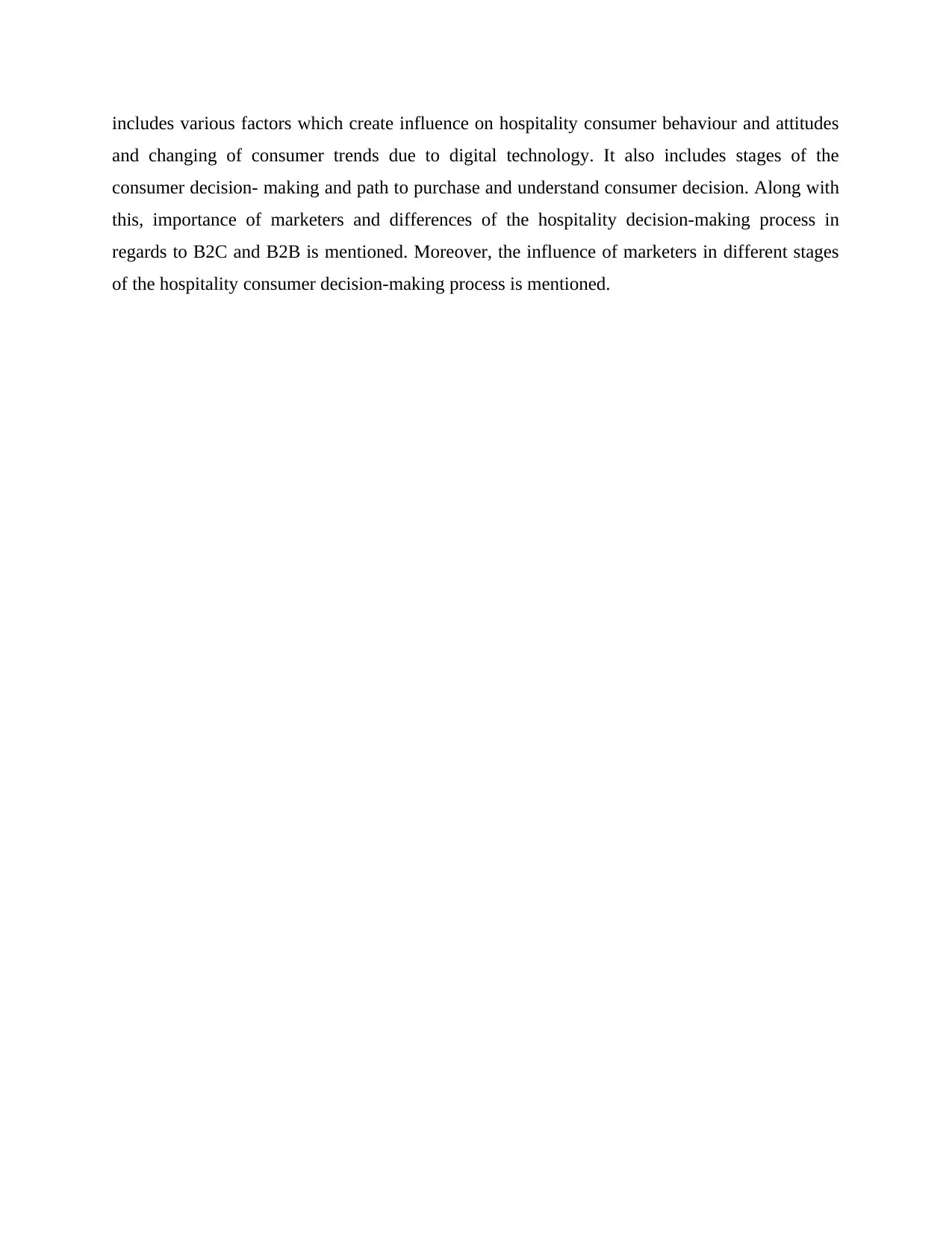
includes various factors which create influence on hospitality consumer behaviour and attitudes
and changing of consumer trends due to digital technology. It also includes stages of the
consumer decision- making and path to purchase and understand consumer decision. Along with
this, importance of marketers and differences of the hospitality decision-making process in
regards to B2C and B2B is mentioned. Moreover, the influence of marketers in different stages
of the hospitality consumer decision-making process is mentioned.
and changing of consumer trends due to digital technology. It also includes stages of the
consumer decision- making and path to purchase and understand consumer decision. Along with
this, importance of marketers and differences of the hospitality decision-making process in
regards to B2C and B2B is mentioned. Moreover, the influence of marketers in different stages
of the hospitality consumer decision-making process is mentioned.
Paraphrase This Document
Need a fresh take? Get an instant paraphrase of this document with our AI Paraphraser
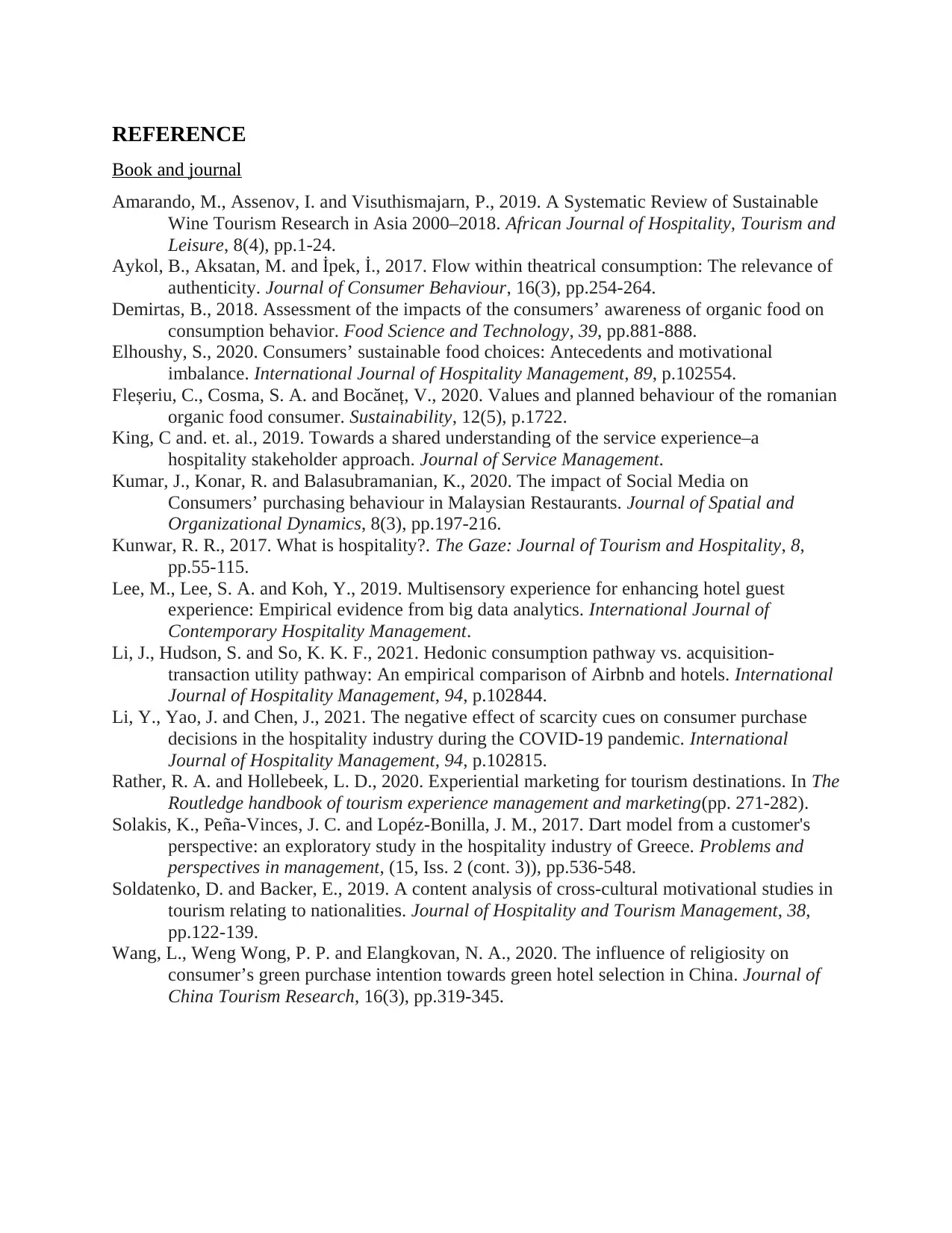
REFERENCE
Book and journal
Amarando, M., Assenov, I. and Visuthismajarn, P., 2019. A Systematic Review of Sustainable
Wine Tourism Research in Asia 2000–2018. African Journal of Hospitality, Tourism and
Leisure, 8(4), pp.1-24.
Aykol, B., Aksatan, M. and İpek, İ., 2017. Flow within theatrical consumption: The relevance of
authenticity. Journal of Consumer Behaviour, 16(3), pp.254-264.
Demirtas, B., 2018. Assessment of the impacts of the consumers’ awareness of organic food on
consumption behavior. Food Science and Technology, 39, pp.881-888.
Elhoushy, S., 2020. Consumers’ sustainable food choices: Antecedents and motivational
imbalance. International Journal of Hospitality Management, 89, p.102554.
Fleșeriu, C., Cosma, S. A. and Bocăneț, V., 2020. Values and planned behaviour of the romanian
organic food consumer. Sustainability, 12(5), p.1722.
King, C and. et. al., 2019. Towards a shared understanding of the service experience–a
hospitality stakeholder approach. Journal of Service Management.
Kumar, J., Konar, R. and Balasubramanian, K., 2020. The impact of Social Media on
Consumers’ purchasing behaviour in Malaysian Restaurants. Journal of Spatial and
Organizational Dynamics, 8(3), pp.197-216.
Kunwar, R. R., 2017. What is hospitality?. The Gaze: Journal of Tourism and Hospitality, 8,
pp.55-115.
Lee, M., Lee, S. A. and Koh, Y., 2019. Multisensory experience for enhancing hotel guest
experience: Empirical evidence from big data analytics. International Journal of
Contemporary Hospitality Management.
Li, J., Hudson, S. and So, K. K. F., 2021. Hedonic consumption pathway vs. acquisition-
transaction utility pathway: An empirical comparison of Airbnb and hotels. International
Journal of Hospitality Management, 94, p.102844.
Li, Y., Yao, J. and Chen, J., 2021. The negative effect of scarcity cues on consumer purchase
decisions in the hospitality industry during the COVID-19 pandemic. International
Journal of Hospitality Management, 94, p.102815.
Rather, R. A. and Hollebeek, L. D., 2020. Experiential marketing for tourism destinations. In The
Routledge handbook of tourism experience management and marketing(pp. 271-282).
Solakis, K., Peña-Vinces, J. C. and Lopéz-Bonilla, J. M., 2017. Dart model from a customer's
perspective: an exploratory study in the hospitality industry of Greece. Problems and
perspectives in management, (15, Iss. 2 (cont. 3)), pp.536-548.
Soldatenko, D. and Backer, E., 2019. A content analysis of cross-cultural motivational studies in
tourism relating to nationalities. Journal of Hospitality and Tourism Management, 38,
pp.122-139.
Wang, L., Weng Wong, P. P. and Elangkovan, N. A., 2020. The influence of religiosity on
consumer’s green purchase intention towards green hotel selection in China. Journal of
China Tourism Research, 16(3), pp.319-345.
Book and journal
Amarando, M., Assenov, I. and Visuthismajarn, P., 2019. A Systematic Review of Sustainable
Wine Tourism Research in Asia 2000–2018. African Journal of Hospitality, Tourism and
Leisure, 8(4), pp.1-24.
Aykol, B., Aksatan, M. and İpek, İ., 2017. Flow within theatrical consumption: The relevance of
authenticity. Journal of Consumer Behaviour, 16(3), pp.254-264.
Demirtas, B., 2018. Assessment of the impacts of the consumers’ awareness of organic food on
consumption behavior. Food Science and Technology, 39, pp.881-888.
Elhoushy, S., 2020. Consumers’ sustainable food choices: Antecedents and motivational
imbalance. International Journal of Hospitality Management, 89, p.102554.
Fleșeriu, C., Cosma, S. A. and Bocăneț, V., 2020. Values and planned behaviour of the romanian
organic food consumer. Sustainability, 12(5), p.1722.
King, C and. et. al., 2019. Towards a shared understanding of the service experience–a
hospitality stakeholder approach. Journal of Service Management.
Kumar, J., Konar, R. and Balasubramanian, K., 2020. The impact of Social Media on
Consumers’ purchasing behaviour in Malaysian Restaurants. Journal of Spatial and
Organizational Dynamics, 8(3), pp.197-216.
Kunwar, R. R., 2017. What is hospitality?. The Gaze: Journal of Tourism and Hospitality, 8,
pp.55-115.
Lee, M., Lee, S. A. and Koh, Y., 2019. Multisensory experience for enhancing hotel guest
experience: Empirical evidence from big data analytics. International Journal of
Contemporary Hospitality Management.
Li, J., Hudson, S. and So, K. K. F., 2021. Hedonic consumption pathway vs. acquisition-
transaction utility pathway: An empirical comparison of Airbnb and hotels. International
Journal of Hospitality Management, 94, p.102844.
Li, Y., Yao, J. and Chen, J., 2021. The negative effect of scarcity cues on consumer purchase
decisions in the hospitality industry during the COVID-19 pandemic. International
Journal of Hospitality Management, 94, p.102815.
Rather, R. A. and Hollebeek, L. D., 2020. Experiential marketing for tourism destinations. In The
Routledge handbook of tourism experience management and marketing(pp. 271-282).
Solakis, K., Peña-Vinces, J. C. and Lopéz-Bonilla, J. M., 2017. Dart model from a customer's
perspective: an exploratory study in the hospitality industry of Greece. Problems and
perspectives in management, (15, Iss. 2 (cont. 3)), pp.536-548.
Soldatenko, D. and Backer, E., 2019. A content analysis of cross-cultural motivational studies in
tourism relating to nationalities. Journal of Hospitality and Tourism Management, 38,
pp.122-139.
Wang, L., Weng Wong, P. P. and Elangkovan, N. A., 2020. The influence of religiosity on
consumer’s green purchase intention towards green hotel selection in China. Journal of
China Tourism Research, 16(3), pp.319-345.
1 out of 14
Related Documents
Your All-in-One AI-Powered Toolkit for Academic Success.
+13062052269
info@desklib.com
Available 24*7 on WhatsApp / Email
![[object Object]](/_next/static/media/star-bottom.7253800d.svg)
Unlock your academic potential
© 2024 | Zucol Services PVT LTD | All rights reserved.



